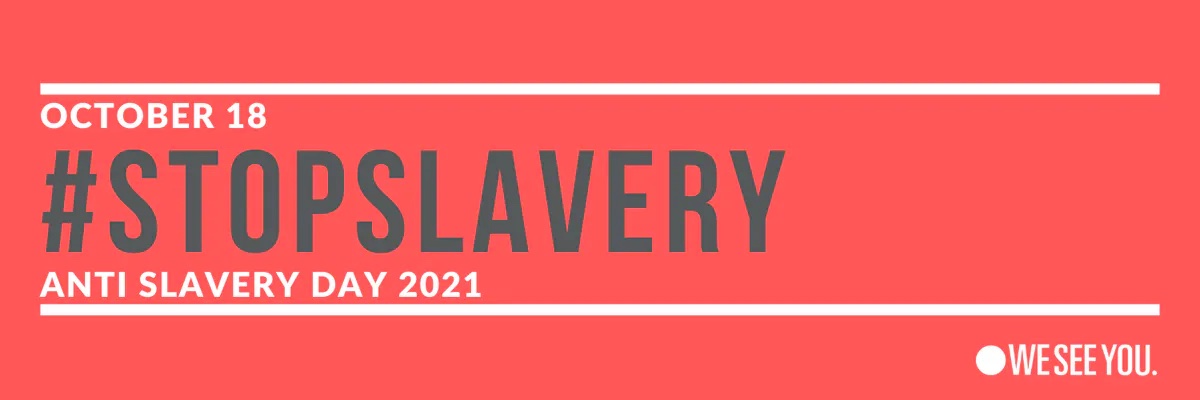
Anti-Slavery Day, held on 18 October every year, provides a national opportunity for individuals, organisations, churches, charities, schools, communities, and businesses to raise awareness of the dangers and consequences of modern slavery, human trafficking and exploitation.
On Sunday 17 October at 3.30pm, there will be a special service at Bristol Cathedral to mark Anti-Slavery Day, organised by The Clewer Initiative (the Church of England’s response to modern slavery), the Bristol branch of the Mothers’ Union and the Dean and Chapter of Bristol Cathedral. Throughout the service, the victims of modern slavery in our diocese will be remembered, and people will find out how to join the fight against slavery in our churches and communities. The service is open to all, and no booking is needed.
For churches who would like Anti-Slavery Day resources to use in their own services, there are suggested Bible readings, hymns, liturgy, prayers, a lament using our senses, ideas to inspire corporate prayers and a house group session here.
The Clewer Initiative will also be organising the national online Church of England service on Sunday 17 October. You can watch the service by signing up here.
Caroline Virgo, director of The Clewer Initiative and local Bristol resident, explains: “Anti-Slavery Day provides an annual opportunity to raise awareness of human trafficking and modern slavery, and encourage government, local authorities, churches, companies, charities and individuals to do what they can to address the problem. We hope that in the Bristol Cathedral service on 17 October, worshippers will be able to find out more about modern slavery, reflect on the suffering of victims and consider the part we can all play in identifying and supporting victims.
“Modern slavery is an abhorrent crime which is present in every single community and victims can be men, women and children of all ages, ethnicities and nationalities. Those we know about are just the tip of the iceberg - many victims never come forward to the authorities and continue to live miserable lives with no freedom or dignity. There are approximately 951 victims of modern slavery in Bristol and it is vital that we learn to spot the signs of slavery in our midst.”
The Rt Revd Dr Lee Rayfield, Bishop of Swindon, who is attending the Bristol Cathedral service on 17 October said: “I wonder how many people within the Diocese of Bristol would be able to tell us that Anti-Slavery Day falls annually on 18 October and came into being through an Act of Parliament? My hope and prayer is that this service will help to increase those numbers, not just highlighting the horrific reality of contemporary slavery but drawing attention to how each and every one of us can play our part in its exposure and eradication.”
Bristol Mothers’ Union Crochet project
The Bristol Mothers’ Union is marking Anti-Slavery Day by creating a giant crochet chain of 951 links to represent the 951 potential victims of modern slavery in Bristol. It is planned that the chain will be first shown at the Bristol Cathedral Anti-Slavery Service on 17 October. Sue Rees, who devised the idea originally and attends Emmanuel Bristol, has been working hard behind the scenes, spreading the word amongst the Bristol craft community, and leading a zoom workshop for interested Mothers’ Union members. She is also planning to connect the 951 links together as soon as the target is hit.
The idea has also gone viral, with many other Mothers' Union branches across the country including Oxford, Cornwall, Manchester, Portsmouth, Chester and Leicester following Bristol’s lead and creating chains to represent the victims in their regions.
Aurea Hart, the Diocesan President of the Bristol Mothers’ Union said: “The project has really caught people's imagination. What I think is particularly powerful is the way we are representing the number of victims in our city – hopefully by making this 951-link chain it will help people begin to grasp the true horror and scale of slavery, rather than just hear an innocuous number. I am also thrilled that other dioceses and groups are picking up the idea and making chains to reflect the number of victims in their areas.”
Resources
- Liturgy and prayers for churches for Anti-Slavery Day
- Online courses and downloadable training materials for churches on modern slavery
- Visiting Bristol Cathedral https://bristol-cathedral.co.uk/visit-us/
- If you think you might be a victim of modern slavery, or have witnessed examples of modern slavery or human trafficking, you can report it here https://www.modernslaveryhelpline.org/report or call the modern slavery and exploitation helpline on 08000 121 700.
- The above helpline is run by Unseen, who are working towards a world without slavery: https://www.unseenuk.org/